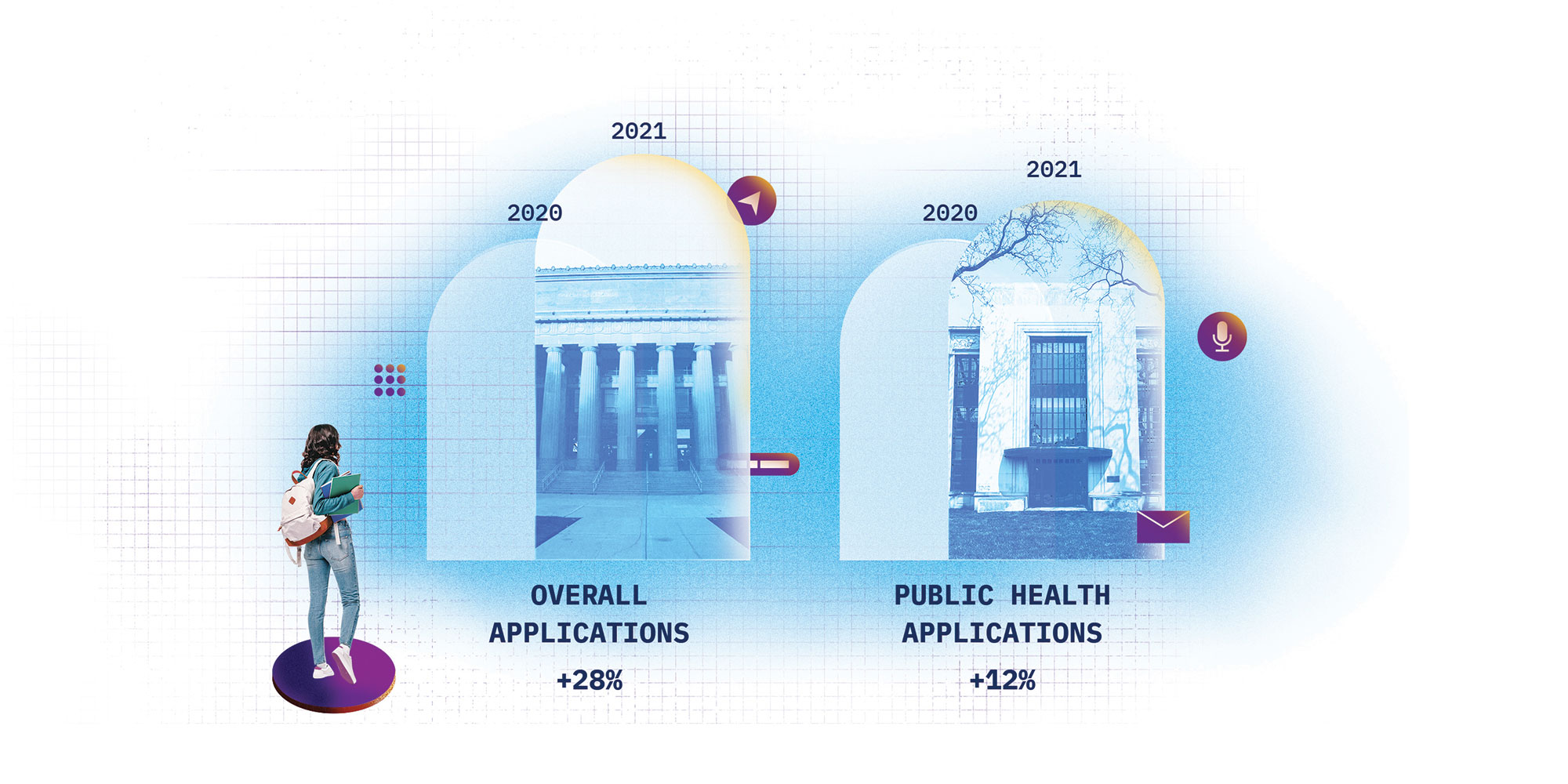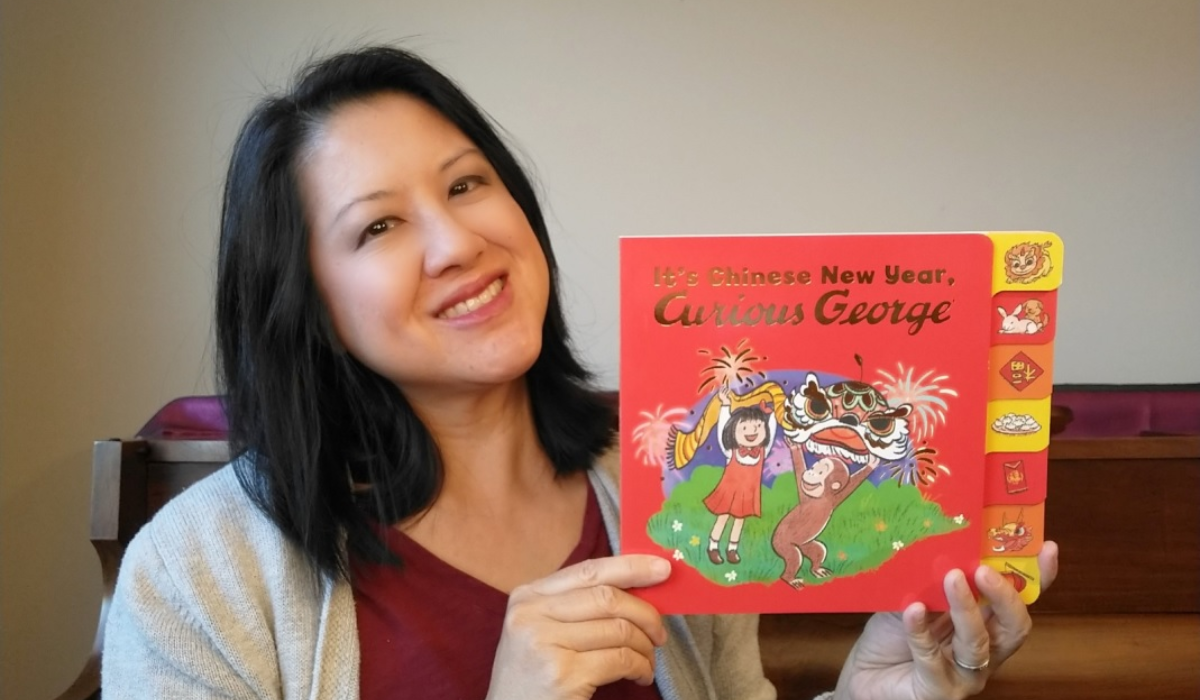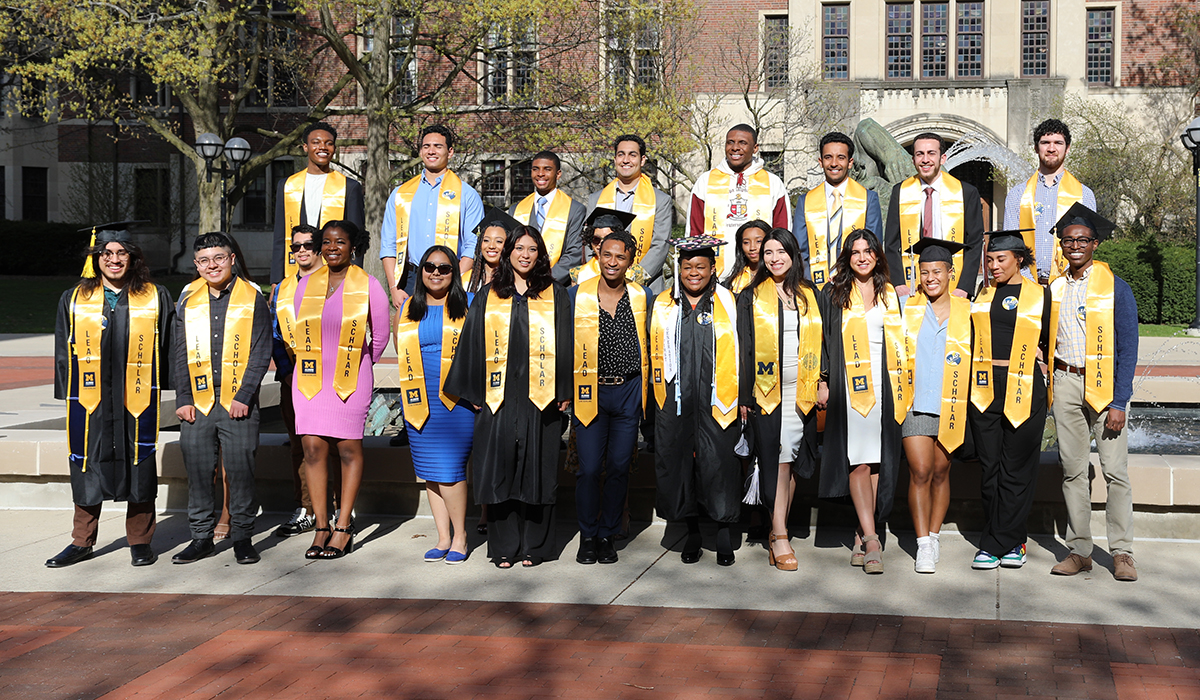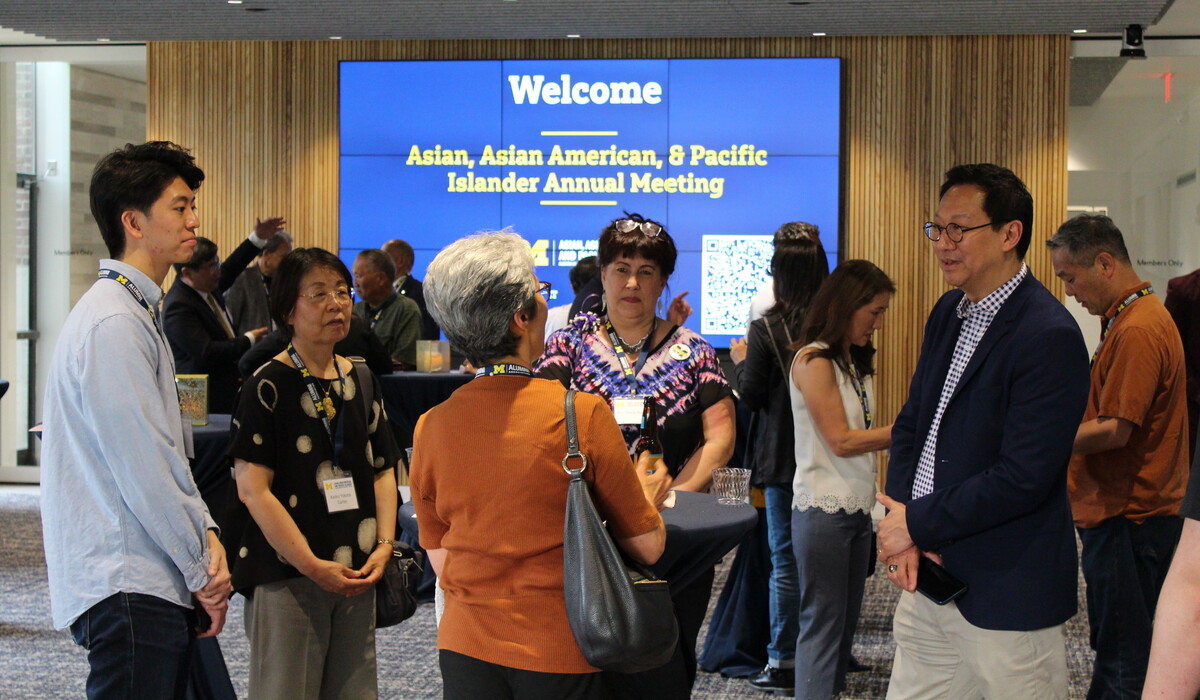Admissions in the Time of COVID
•
Illustrations by Gabrielle Merite
Before moving into Bursley Hall in late August, first-year student Jeffrey Jin had never set foot on the U-M campus. But by last April, when the Texas native learned he had been admitted into the LSA Honors Program, he could tell you which residence halls are most conveniently located and which dining hall has the tastiest food. He knew honors classes offer special access to professors and that the Department of Political Science is top notch. He could even suggest a place to get a bite to eat off campus.
In fact, between YouTube videos and Reddit posts, Jin felt pretty confident that he knew what to expect upon arrival on campus this fall. He had spent hours reading the candid opinions of current U-M students, along with those at more than a dozen other colleges he applied to last fall. Day-in-the-life videos gave him a taste of what his first year in Ann Arbor might hold. A Zoom meeting for prospective students in the Houston area let him ask U-M alumni about paying out-of-state tuition and dealing with the dramatic difference in climate. Online, Jin also found his roommate, a fellow high school senior who gave him a personal tour of campus via FaceTime.
“We’re, like, the exact same person,” Jin says. “It is incredibly convenient that we found each other.”
Accepting an admissions offer from a college sight unseen and more than 1,200 miles away might sound like a wild leap of faith—but for the incoming class of 2025, it wasn’t an uncommon experience. As shelter-in-place orders, travel restrictions, and COVID caution ruled out the typical campus tour, high school seniors had to get resourceful as they researched schools and imagined their future.
Meanwhile, U-M admissions officials found creative ways to help the next class of 2025 make the biggest decision of their young lives.
As director of U-M’s Office of Undergraduate Admissions, Erica Sanders knew from the first months of the pandemic that building the class of 2025 would present a special challenge. The first step is always reaching out to high school seniors who might be a good fit to encourage them to apply. With in-person events discouraged during the past year, Sanders and her counterparts at Michigan’s 14 other public universities worked together to ensure students across the state had as much information as possible about the educational options available at all the state’s four-year institutions.
Next, U-M’s admissions office had to figure out how to help prospective applicants get to know the University at a time when travel and in-person events were prohibited. So they planned virtual question-and-answer sessions, worked with campus partners to create school- and college-specific virtual programming, made materials available to give high schoolers near and far a sense of campus life, and worked to soothe applicants’ worries caused by the pandemic while periodically providing updates to school counselors.
“All of those things certainly provided a lot to think about,” Sanders says.
The key to making it all work was flexibility. Knowing that many applicants had lost access not only to on-campus visits but also to in-person standardized testing, curriculum options, extracurricular activities, and even teachers and guidance counselors who might have advised them about college applications, the University extended deadlines to give applicants more time to complete their applications and submit required materials.
Meanwhile, applicants themselves found creative ways to adapt at a time when most U.S. high schools closed their buildings for all or part of the school year.
“The biggest challenge with college applications was not being able to connect with classmates at school and talk to them about the process,” says Hailey Love, a first-year student at the Ross School of Business and a LEAD Scholar. “But people found different ways to be helpful, like group chats and support groups and Instagram pages. Social media helped to create a different type of community for this year’s application process.”
Maeve Everett, a first-year student in LSA, had spent years diligently practicing for her college admissions exams, but when it finally came time to take the tests, her dates were repeatedly canceled due to the pandemic.
“It was the most frustrating part,” says Everett. “I really just saw no hope in it. So I kind of stopped studying. I didn’t try as hard. And then once I was actually able to take an SAT after months of having tests canceled, I wasn’t able to reach my full potential.” It came as a relief to Everett, who had always dreamed of college in Ann Arbor (“I bleed Maize and Blue”), when U-M, like more than 300 other universities nationwide, made standardized tests optional for 2021 applicants.
“It just felt like they were more caring,” she says, “like they were aware of the situation.”
Cognizant that young people last year faced many tough situations—ranging from bureaucratic frustration to COVID-related trauma—the admissions office encouraged applicants to share their COVID-related experiences in the form of an optional short essay on the Common Application or through short answer questions on the Coalition Application. It was through these that Sanders and her staff got a better picture of how teenagers were experiencing the pandemic. (The Alumni Association encouraged applicants for the LEAD scholarship to submit similar essays. See below for two examples.)
“Students whose parents were front-line workers really thought about the impact of these circumstances on their families,” Sanders says. Other applicants were essential workers themselves, with jobs in child care, retail, or food service. Some had ill family members or unemployed parents, while others struggled with the transition to online learning. Says Sanders: “Many of them wrote about it very articulately.”
While admissions staff were moved and impressed by many of the applicants, Sanders says, it was also a more competitive year, with increases in applications across all categories—in-state, out-of-state, and international. A new record for applications was set, with 83,029 from first-year students for the fall of 2021, an increase of almost 28% since 2020, when 65,021 applied. The University offered admission to 16,235 students and as of mid-July had enrolled 7,529, which will make the incoming class at least 9% larger this year, compared with the fall 2020 enrollment of 6,879.
It’s not clear why the number of U-M’s applications jumped, but Sanders says it’s part of a pattern among flagship schools nationwide, a trend that she believes may be related to students’ desire to be near a major medical institution. Pandemic-related interest was certainly part of the reason why applications to U-M’s School of Public Health (SPH) were up 12%, including a 32% increase in applications from underrepresented minorities, says Rachel Casanova, SPH’s director of student affairs.
“Students are coming to us with a greater idea of what public health is and how they can make impact within it,” Casanova says. “So many of the personal statements are really geared toward questions about the pandemic and marginalized groups or, ‘My grandmother got really sick and this made me realize I need to make a difference here.’ We’re getting a lot of difference makers, which I guess is a positive within a pretty traumatic experience.”
Given the impact of the pandemic on the performing arts, the School of Music, Theatre & Dance (SMTD) also saw an increase in applications.
In Their Own Words
Many incoming first-year students shared the impact of COVID-19 on their lives via optional essays on their college applications. The Alumni Association encouraged applicants for the LEAD scholarship to submit similar essays. Following are two of those submitted by current LEAD scholars earlier this year.
Grateful for Every Day
COVID-19 has impacted me in ways that I haven’t even fully processed yet. I lost several family members, was a front-line worker for the entire stay-at-home order, and missed out on opportunities at school: varsity track, OCC first student art showcase, OCC first indoor garden, and memories with friends and family.
Last year, when it was announced that we wouldn’t be returning to school, it felt like all that I had worked for was crashing down right in front of me, and I couldn’t do anything to stop. That feeling stayed with me when I lost my grandfather and my uncle. When I was a front-line worker, I was in constant fear of getting my family, co-workers, myself, or strangers sick and potentially ending my life or others. All of these feelings resulted in me feeling helpless.
However, I was able to change that outlook and work on bettering myself and coming to terms that life is unpredictable: you have to savor every good moment and be quick to learn from and forget the negatives. This lesson turned me into a person eager for every day and grateful for all things in life, from the big events to the smallest interactions.
—Daniel Williams, LSA
Lessons from the Pandemic
The COVID-19 pandemic affected the world in a huge way; many of us had the same experiences yet feel very alone and isolated throughout it.
Personally, the pandemic helped me become more appreciative of what I have. My parents, being janitors/laborers, were thankfully still able to work, but that also meant that they were constantly being exposed to the virus as they work at a local clinic. It caused so much anxiety not only for my siblings and me, but also for my parents because they had no other choice than to continue working to be able to provide for us. They couldn’t quit because there was an evident lack of hiring and increase in unemployment in our area. Especially toward the beginning, it was hard because my parents didn’t want to put my siblings and me in danger of getting infected, so they would quarantine themselves from us whenever they felt the slightest bit ill.
Luckily, we never had COVID-19, as far as we know. The COVID-19 pandemic was a time not only of grief and anxiety, however. I feel that I’ve grown more comfortable with myself and have learned to communicate my issues and boundaries to others without feeling guilty for doing so. For me, the pandemic was also a time of self-growth, appreciation, and allowed me to get involved in things that I otherwise would not have been able to. I’ve met so many good people through Zoom calls and made incredible memories that I will never be able to forget.
—Elizabeth Jaramillo, LSA

“The arts have been severely curtailed by the pandemic,” says Laura Hoffman, the school’s assistant dean for admissions and enrollment management. “Yet many of our young performers and scholars have been resilient in their pursuit of advanced study.”
Applications at the undergraduate and graduate levels were up about 5% this year, Hoffman says, topping 5,000. And because SMTD requires artistic portfolios and auditions as part of its admissions process, that meant some 5,000 young people had to find a way to demonstrate their talents virtually. In previous years, prospective students were invited to campus to audition in person, but that couldn’t happen this year. Meanwhile, many undergraduate applicants were unable to access instruments or performance spaces because their high school buildings were closed.
“They might have previously had access to a dance floor,” Hoffman says. “But how do you do that in your own home if, say, you’re in an apartment in New York?”
As with everything, applicants and staff had to be flexible—dancers squeezed their choreography into smaller spaces, percussionists managed to show off their talents without their timpani, and violinists learned to work within the auditory limitations of Zoom. To help, professors created videos that instructed applicants on how to put their best feet forward, covering everything from lighting to Zoom settings to microphones.
It was a difficult year, Hoffman acknowledges, but there were some lessons learned that will likely contribute to smoother application processes even after U-M and other universities return to a post-pandemic approximation of normal. Virtual visits, for example, expand access to prospective students who may not be able to travel for non-pandemic reasons.
“There are some wonderful things that I know we’re going to keep,” Hoffman says, “and some other things that are going to be up for serious discussion.”
That will be the case at Sanders’ office, too, where the staff is crunching the numbers from last year’s applications and figuring out which changes are worth keeping and which should be eliminated for the class of 2026.
“We’re certainly exploring lessons learned,” Sanders says, “as are, I think, our colleagues around the country.”
Back in Texas, Jeffrey Jin is looking forward to getting “as far away as possible” from the town where he has spent 18 years, especially after a year and a half of virtual classes and online-only socializing. But as different as this year was, in many ways his excitement and trepidation are the same as any teen, in any era, might feel as he prepares to embark on the next stage of life.
“A change in climate and environment and people will mix things up a bit, and that’s what I’ve been working towards all throughout high school,” Jin says. “I guess what I’m nervous about is the same as what I’m excited about—and that’s the same for a lot of people: It might feel like you’re a tiny fish in a huge ocean. But I’m just going to take advantage of all the resources on offer. I’m looking forward to finding my niche.”
Amy Crawford is a writer living in Ann Arbor. Her stories have also appeared in Smithsonian, HuffPost, and Nature Conservancy magazine.



